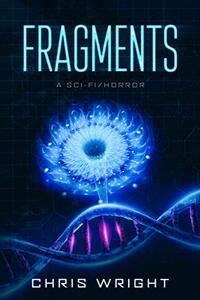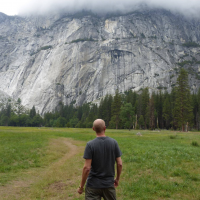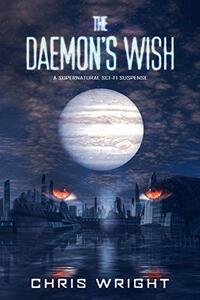Chris Wright Interview Published on: 22, Apr 2021
 Born and raised in Derbyshire, UK, which is your most cherished memory?
Born and raised in Derbyshire, UK, which is your most cherished memory?
Well, child hood is a vast experience when you look back at it, where 1 year felt like several. I would say that being on the edge of the countryside was always inspiring and great memory I have. Derbyshire has such a lot of beautiful countryside where you could wander off all day if you wanted, deep into the woods and valleys. It’s probably where my interest in supernatural and otherworldly subjects was born, as the landscape lends itself to mystical and ancient folklore, with early morning mist and forest creatures rustling around at night.
Were you an avid reader as a child? Do you still read books?I was definitely an avid reader as a child. I read a lot of fiction then, but that trailed off a lot when I was older. I rarely read fiction books now, I tend to read Historical, Science, and spirituality books, with a keen interest in historical or paranormal mysteries. I think a lot of what I read is reflected in my own fictional works as it gets the cogs in my mind whirring.
Do you think it’s important for parents to read for their children?Yes I do. A child has such a fertile imagination that books can inspire them so much. It also generates an understanding of the world and relationships around them and is probably just as important as social interactions for a child in helping them grow.
When and how did you decide that you wanted to be a professional writer?I had always written short stories throughout my childhood and in my late teens I tried writing a full length book called ‘Freak’. It was called that because freak supernatural occurrences had happened around the main character all of his life. I built the supernatural and paranormal elements into a rather odd story that involved time travel (or ‘making’ as I described it), a robot from the future, gangsters, showers of fish from the sky and a hundred other strange elements. It was a supernatural comedy with a bit of action and crime involved, and incredibly weird. It may be something I go back to one day and re-write. After that I started a later book that I never actually finished which I can’t actually even remember the name of now. It was a strange mix of Roald Dahl meets aliens and folklore. It was another odd thing really, a little quirky and I just threw a kitchen sink of ideas at it and then wasn’t sure how to finish it. After that I didn’t write anything at all, other than notes for my record label’s new releases, for over twenty years. I sat there one day in 2019 and just suddenly felt inspired to write again. I have such a lot of ideas in my head that I wanted to get them out, if only for me to read myself.
What challenges did you face while writing your first novel, 'Survival'?The challenge I had was making it interesting. I had the ending and the beginning in my head and sketched out, and I had a rough idea of the middle part. The middle part however was the majority of the book, so I struggled for quite a while to keep the momentum going. I didn’t want to have pages of non-stop action that suddenly end and for the book to limp along before something good finally happened again. This has to happen to a certain extent, but I wanted there to at least be something interesting or noteworthy on every page. I got quite a bit of writer’s block during that middle part. I knew where I was going, but writing my way steadily too it was quite arduous.
How and when was Omni UK Publishing started?I started it at the same time as the first book was published in late 2019, mainly so that I had a separate entity from my music label (Omni Music) that I can use as a brand. The intention was to release just my own books, because I found it so incredibly difficult to get on to an established publishers books, but am also willing to publish books for others. That hasn’t yet, but you never know. I had the same intention with my music label. It was set up because I was fed up of the politics of trying to have music signed to other labels, and had various experiences that were quite negative. I decided to set it up to release my own music and be unrestrained, and as time went on I was sent numerous music demos from around the world, and it snowballed, so that I now release music from across the globe more than I release my own. I have artists from the US, UK, Mexico, all over Europe, Russia, Israel and so on.
Did you plan all the books in advance in the Survival trilogy?No, originally it was a one off book and ended where it did. But, I felt that I had a lot more ideas, admittedly rather strange ideas, so found a way to carry on with the second part. Again, that was going to be the end, but my editor lay down the gauntlet and challenged me to do a third as he said a trilogy would be great, especially as he thought that my writing was getting better. So, I accepted the challenge, and I was really pleased I did, because the third part is much longer and grander and allowed me to really expand on the characters more. As a result I think it’s my favorite part of the series, as I was really able to let loose with unusual ideas while tying the first two parts in to it. I wanted the intensity to ratchet up a little too, so some parts go very deep into the characters horrific experiences. The books at the end of the day are all about hope and the possibility of what is out there, so no matter how hard it gets for them there is always a ray of sunlight somewhere.
Who inspired the character of Gina in "I Am Auton"?There was no one in particular. She is one of the main characters in the whole series, introduced (as they all are) at the very beginning of the first book in the trilogy. The characters are ethnically varied, a subtle thing which is never explained directly, but a little thought about what happens at the very end of Survival gives a bit of a clue. So, it’s quite a diverse cast, and during the writing of the first two books I gradually filled in their character traits so that by the end of the third one they are much more rounded and believable. Gina is of Japanese heritage, small in stature, but with a cheeky demeanor and confidence. In each book I have started with one of the characters before I introduce the others, in the first story it’s Danny and in the second it’s Brandon. In the third one, I wanted one of the female characters to have the opening scenes, and my lifelong fascination with ninja’s gave me the backdrop as to who it would be and what could happen. Gina is one of my favorite characters in the series, as she is feisty, but also compassionate and quirky, and in the third novel also quite deadly!
Your thoughts on conventional vs. self-publishing? What route did you choose and why?For myself it seemed almost impossible to get my foot in the door with conventional publishing, it seems to be such a closed loop. Most publishers don’t accept unsolicited submissions, they only deal with agents. Every agent I approached wasn’t accepting new clients, so I was momentarily stuck. I then found some publishers that did accept submissions without an agent, but surprise surprise, none of them were accepting submissions at that moment. That only left the self-publishing route, which thanks to Amazon is pretty easy (although, not just Amazon as there are other good self-publishing routes such as Draft 2 Digital for other stores that I use). It’s easy, but immensely difficult to get any books noticed because there are so many of them released vying for people’s attention. The more money you have to spend on promotion and advanced reviews it seems the more successful you tend to be. I learnt all this the hard way, struggling from day one to get sales, and it’s still a struggle as I simply don’t have thousands of dollars to spend every month promoting.
What’s one inaccuracy in a science fiction novel that drives you crazy?I would say when something very big in a story makes no sense scientifically. I know science fiction has always stretched the boundaries of credibility to a certain extent, but one book I saw recently had humans trying to colonize one of the solar systems’ outer planets, which was miraculously now a rock like planet. The particular planet they chose is a gas giant and it is geologically and physically impossible for it to turn into a rocky planet like Earth. So that put me off straight away, as it made no sense. My newest book is set on a newly colonized world, and I was careful to look at what it would be like and how it could be possible. I think when writing sci-fi you do tread the thin line between the believable and the unbelievable, but there has to be a point where you need to ground it in some kind of fact.
What are your favorite science fiction novels, and what is it that makes them so good?I have really enjoyed the recent Expanse series. What makes that so good is its scientific realism. In an odd way, it made me want to make parts of my Survival universe as equally scientifically real, but there are limits to what science knows, believe and can prove, which is where my paranormal and supernatural parts take over. As mentioned before, I don’t read much fiction now, so most of what I read are older books that have stayed with me. Ones of particular note are Philip K Dick’s books, which I really love, and some classic Stephen King books are always a great read.
Are record labels still relevant to success?I think that depends on the music scene you are in. My label is on the fringes of the dance music scene, with an audience far below the mainstream dance hits that pervade the charts. In this particular scene, the record labels have an image in the same way an artist does. They have their own specific sub-style and fan base, things which often overlap. An up and coming musician or producer can get a head start by appearing on a well-known label, where they are suddenly and briefly thrust into the limelight. It can work wonders for them and they suddenly get a lot of attention from other big labels or DJ’s that will support their work. You do of course get those artists that become big enough to make it on their own, so they can then call the shots or even set up a label of their own and be fully in charge. It’s very different (I would imagine) as to how big corporate music labels work. I would imagine that they are a little more cut throat than us smaller independent labels. We are generally striving to help the artists get noticed and please our own fan base. So, in answer to your question, it depends on the record label and the artist, as well as the scene they both inhabit, as to whether it’s relevant to success. In the scene I am involved with; well-known labels can act as stepping stones for artists and both being an artist and a label are both equally recognized by the music listeners.
What is the next book you are looking forward to writing? What is it about?I have just finished my next book and it’s called The Daemon’s Wish. It’s a cross-genre Sci-Fi, Horror, Suspense Thriller mystery book, so I think I covered most subjects that interest me! It’s set in the future when humanity has colonized Jupiter’s moon, Europa. A series of gruesome crimes suddenly spring up and the police and their criminal profiler are on the hunt for the killer, but nothing is quite what it first appears and they begin to suspect their own criminal profiler. It has a strange supernatural element throughout mixed with the sci-fi scenario. The book could quite easily have been set in modern day, but I wanted to give it an interesting twist and use my imagination, so setting in the future on an alien world allowed me the freedom to conjure up some great ideas. My editor told me it was the best book from me yet, which was certainly encouraging.
How did you first learn about AllAuthor? In what ways has this website helped you as a writer?I think I read about AllAuthor on a forum somewhere, I can’t actually remember which one off the top of my head. It has helped me gather a few followers I wouldn’t have otherwise and to generate a number of promotional adverts quite easily, which I use to post on Instagram, Twitter and my Facebook page. It gives each book a weekly promotional bump with a striking image surrounding them.
Share Chris Wright's interview
Born and raised in Derbyshire, UK, Chris Wright was an avid reader as a child. He had always written short stories throughout his childhood and in his late teens, he tried writing a full-length book called ‘Freak’. Author of crazy science fiction and horror, Chris is also the owner of Omni UK Publishing.
 Survival: A Sci-Fi/Horror, where reality begins to bite.
Genre: Supernatural Suspense, Science Fiction, Fantasy, Horror
Survival: A Sci-Fi/Horror, where reality begins to bite.
Genre: Supernatural Suspense, Science Fiction, Fantasy, Horror
 Fragments: A Sci-Fi/Horror: The sequel to Survival: The rules of reality have now changed
Genre: Supernatural Suspense, Science Fiction, Fantasy, Horror
Fragments: A Sci-Fi/Horror: The sequel to Survival: The rules of reality have now changed
Genre: Supernatural Suspense, Science Fiction, Fantasy, Horror
 I Am Auton: Part 3 of the Survival Trilogy
Genre: Supernatural Suspense, Science Fiction, Fantasy, Horror
I Am Auton: Part 3 of the Survival Trilogy
Genre: Supernatural Suspense, Science Fiction, Fantasy, Horror


